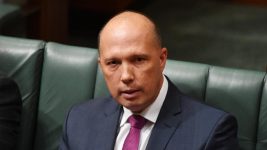Dutton Considers Increasing Government’s Surveillance Powers

A proposal was recently floated by two government department officials to enhance the powers of Australia’s cyber spying agency, to enable it to digitally surveil Australian citizens from right here without a warrant. The proposal, if adopted, would add to the already-pervasive surveillance of Australians through meta-data retention laws, the Five Eyes alliance arrangement and a range of other laws and mechanisms.
The Sunday Telegraph reported on April 29 that it had obtained “top secret letters” detailing a proposal that the Australian Signals Directorate (ASD) be given the power to remove domestic cyber threats by “hacking into critical infrastructure.”
Currently, the law provides that the ASD is not meant to spy on Australian citizens. Rather, the Australian Federal Police (AFP) and domestic spying agency ASIO have the power to investigate citizens after a warrant has been issued by the attorney general. They may also, as previously reported, access the meta-data of citizens without a warrant. Indeed, such data has already been misused by the government and its agencies – rather than fighting terrorism, state agencies have been using meta-data to:
- hunt down journalists who publish material that is critical of the government,
- silence doctors who speak out against human rights abuses in detention centres,
- prosecute whistleblowers who expose government corruption,
- track down people who dump rubbish,
- identify people who evade tax, and even
- monitor the sexual activities of cadets.
The said “secret” documents are reported to have outlined that Australian home affairs secretary Mike Pezzullo wrote to defence secretary Greg Moriarty first spruiking the proposal in February. However, a formal plan for legislating the move is yet to be presented to the government.
Leaving the door open
Following the leak, both the home affairs and defence secretaries, along with ASD director Mike Burgess, issued a joint statement asserting that there is no current proposal “to increase the ASD’s powers to collect intelligence on Australians or to covertly access their private data.”
However, home affairs minister Peter Dutton subsequently stated that the option of expanding ASD powers was a possibility. However, in his customary way, Dutton denied that the safeguards of “the attorney general or the relevant justice” would be bypassed if such a scheme were adopted.
Operating outside the law
Formed in 1947, the ASD is the government security agency charged with foreign intelligence collection, as well as the security of armed services and government department communications.
The agency plays a major role in the Five Eyes alliance arrangement, collecting signals data in the South Asia and East Asia regions. The alliance is a secretive information sharing agreement between Australia, the US, the UK, Canada and New Zealand that was established in 1946.
The ASD is allowed to conduct certain activities that are against Australian law when it’s operating overseas. Over the past 70 years, it has developed from a body focused on collecting defence signals into a streamlined cyber spying agency.
Turning eyes upon its own
Civil Liberties Australia chief executive Bill Rowlings explained that at present, the ASD is permitted to spy on Australians when they’re overseas. But when an individual returns to Australia, the agency is supposed to halt this surveillance “or go through a complex process of authorisations to continue.”
“This is the so-called onshore/offshore distinction and it is meant to protect the privacy of Australians and to maintain the critical distinction between ordinary policing and defence and spy agencies,” Mr Rowlings told Sydney Criminal Lawyers®.
According to the civil liberties advocate, it’s really no surprise that Dutton wants to abolish this distinction, as he has “overseen the militarisation of the bureaucracy and his home affairs department contains both the AFP and ASIO.”
“We warned against mixing these two agencies when this Frankenstein department was proposed,” he added.
The super ministry of Dutton
The establishment of the home affairs department with minister Dutton as its head was announced in July last year and came into being on December 20. The new super-ministry combines immigration, border security and domestic security.
Prime minister Turnbull said that having the AFP, ASIO and the Australia Border Force all reporting to the one minister would strengthen Australia’s ability to deal with the evolving threat of terrorism.
However, critics warned it was a move towards centralising and consolidating government power into one person.
Maintaining the division
“Civil Liberties Australia is opposed to any moves to give our spy agencies enhanced powers to intrude into the lives of Australians,” Mr Rowlings made clear. He went on to explain that such a move would blur the line between spying and policing, which currently provides some protection to Australians.
As Rowlings puts it, the police “are still far more accountable to the public than our spying agencies.” He explains that police are a readily-identifiable entity who are meant to seek judicial approval for warrants and oversight bodies to surveil people.
“In contrast, our spy agencies operate in secrecy, with a docile and sympathetic parliamentary committee the only fig-leaf of public accountability,” he remarked. He further pointed to the fact that the activities of these agencies only require ministerial approval.
“Transparency and accountability are impossible when the law makes it a crime, punishable by many years in prison, to even report the name of an intelligence officer,” Rowlings emphasised.
Spies to keep police powers
ASIO was officially transferred from the attorney general’s portfolio into the hands of minister Dutton on May 9. The next day, the parliamentary joint committee on security and intelligence recommended the agency retain some of the policing powers it gained back in 2003.
The laws currently under review allow ASIO to obtain a warrants to question, or question and detain, an individual under compulsion in order to gather intelligence in relation to a terrorism offence.
Question and detention warrants can be “obtained where there are reasonable grounds for believing that, if the person is not immediately detained, the person may alert someone involved in a terrorism offence,” or if other methods of collecting intelligence would be ineffective.
Under a questioning warrant, ASIO officers are able to question an individual for up to eight hours, but this can be extended up to 24 hours on request. An individual can be detained on a questioning and detention warrant for up to seven days.
The parliamentary committee pointed out that ASIO’s powers of compulsory detention have never been used and recommended they be revoked.
However, it recommended the agency retain its powers of compulsory questioning. A total of sixteen questioning warrants have been issued in the past.
Fascist overtones
“This proposal from Dutton would turn our spies into the secret police of authoritarian regimes,” Mr Rowlings remarked. He stated that if police currently aren’t cable of disrupting domestic criminal activity, perhaps better electronic tools training is needed.
And “if our spies want to exercise police powers, then they should enrol in a police training program and leave the intelligence community and join the force,” he concluded.








